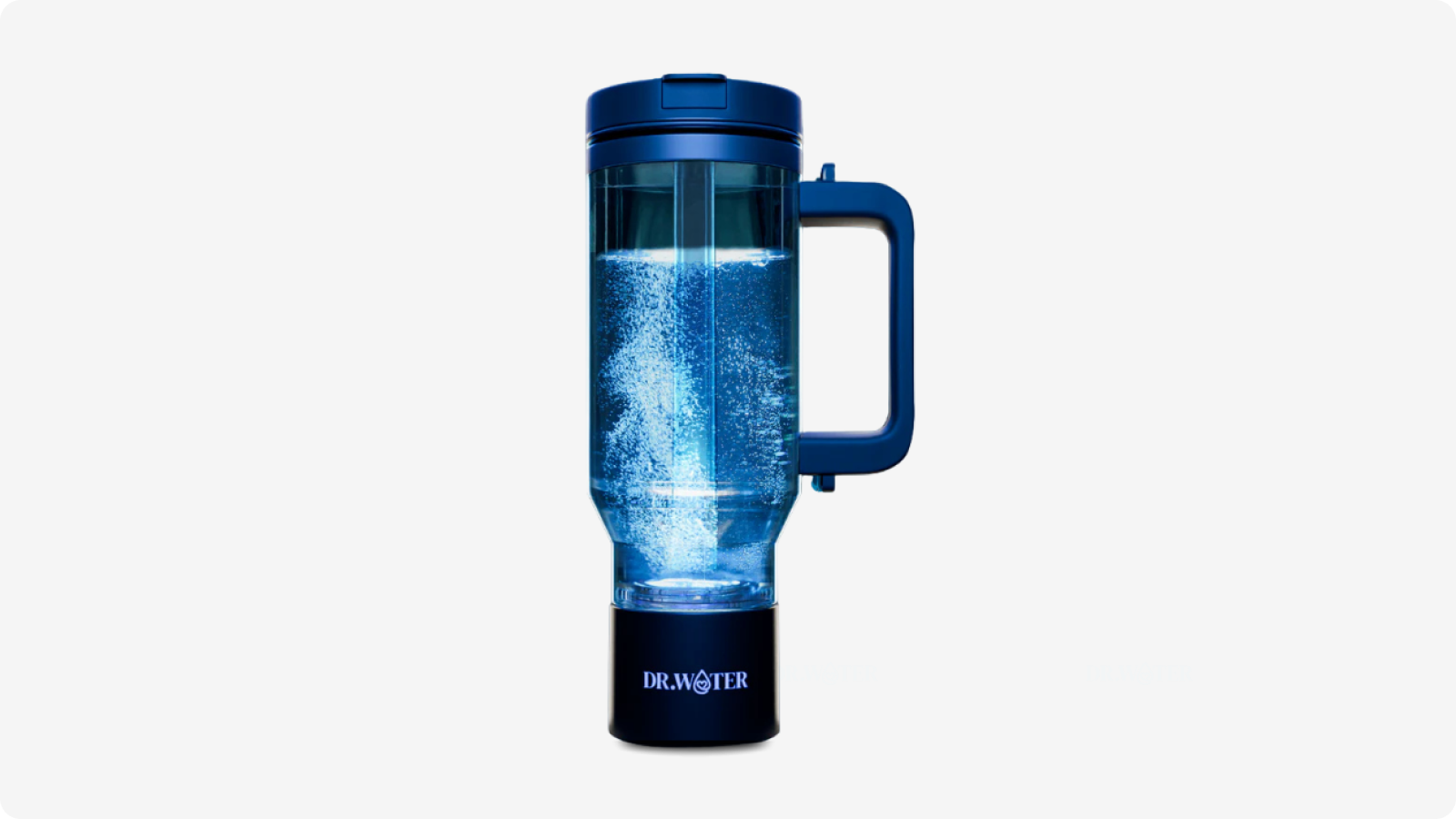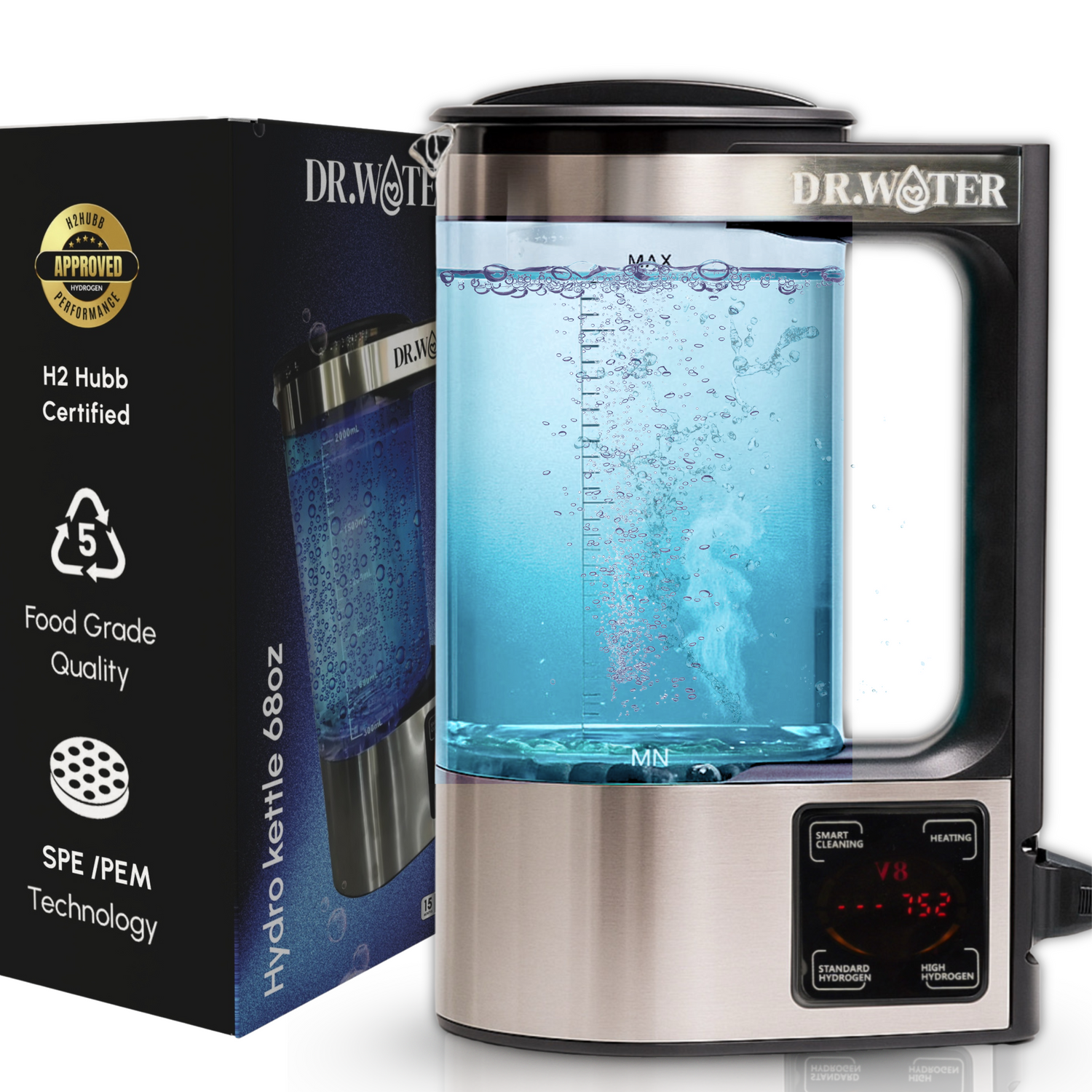
What Is the Best Water to Make Hydrogen Water? A Complete Guide
Share
Summary
|
Are you trying to determine which water makes the best hydrogen water? With hydrogen water gaining popularity fast, people want to know how to get the most from it. The global hydrogen water market was valued at about USD 821 million in 2025 and is expected to grow to over USD 2 billion by 2034, showing how many are jumping on board.
Choosing the right water matters because it affects the hydrogen levels and how well your device works. In this guide, we’ll break down different water types and what works best for making hydrogen water that delivers real benefits.
What is Hydrogen Water and How It’s Made?
Hydrogen water is simply regular water infused with extra molecular hydrogen gas (H₂). This added hydrogen acts as a powerful antioxidant that may help reduce oxidative stress and support overall wellness.
Here’s how hydrogen water is typically made:
- Electrolysis: An electric current splits water molecules into hydrogen and oxygen, dissolving hydrogen gas into the water for immediate use.
- Magnesium Reaction: Magnesium reacts chemically with water, releasing hydrogen gas that enriches the water.
- Pressurized Infusion: Hydrogen gas is forced into water under high pressure, sealing it to preserve hydrogen content for later consumption.
Each method produces fresh hydrogen water, which offers the highest potency and benefits.
Now, the question arises: Which water best makes that highly beneficial hydrogen water at home?
What Water Is Best to Make Hydrogen Water?
Not all water is the same when it comes to making hydrogen water. The type and quality of water you use affect both the hydrogen levels and the taste.
Let’s explore the most common water types and their pros and cons for hydrogen infusion.
1. Mineral Water
Mineral water comes from natural springs and contains important minerals like calcium, magnesium, and potassium. These minerals support your body’s health by aiding bone strength and muscle function.
While mineral water hydrates well and tastes good, its mineral content can interfere with the process hydrogen water bottles use to generate hydrogen gas. High levels of minerals can slow down or reduce hydrogen production.
Let’s explore its pros and cons in detail:
Verdict: Use with care. Mineral water works, but lower mineral levels improve hydrogen infusion. To get the best results from your hydrogen bottle, look for mineral water brands with lower mineral content.
2. Spring Water
Spring water comes from natural underground sources, similar to mineral water, but usually has fewer minerals dissolved in it. This lower mineral content helps hydrogen water devices work better by allowing hydrogen to infuse more easily and efficiently.
Spring water offers a clean, refreshing taste without interfering with the hydrogen generation process. Because of its natural purity and balanced mineral levels, spring water is a popular choice for those looking to get the most from their hydrogen water bottles.
Verdict: Highly recommended. Spring water offers the best balance of purity and minerals for effective hydrogen infusion without sacrificing taste. For best results, pair it with Dr. Water’s HydroStanley hydrogen water bottle, which provides convenience for enjoying hydrogen at home.
3. Alkaline Water
Alkaline water has a higher pH, usually above 7, and is often marketed for its potential to reduce body acidity. While it may have some benefits, its elevated pH can disrupt how hydrogen water bottles work, reducing the efficiency of hydrogen infusion.
The higher alkalinity interferes with the electrolysis process that generates hydrogen gas, meaning your bottle might not perform as well. For the best results, sticking to waters closer to neutral pH is a smarter choice.
Verdict: Not recommended. The elevated pH in alkaline water makes it a poor fit for hydrogen water bottles and lowers hydrogen infusion effectiveness.
4. Carbonated Water
Sparkling water, or carbonated water, is infused with carbon dioxide, giving it that familiar fizzy texture. While refreshing and fun to drink, it’s not the best choice for hydrogen water bottles.
The carbonation can disrupt the ionization process and may even cause damage to the bottle’s components due to the added pressure from the carbon dioxide. The fizz that makes sparkling water so enjoyable is the same factor that makes it incompatible with hydrogen infusion technology.
Let’s discover its pros and cons:
Verdict: Not recommended. The carbonation disrupts hydrogen infusion and may damage your bottle, so avoiding using sparkling water with hydrogen water devices is best.
5. Distilled Water
Distilled water is created by boiling water into vapor and then condensing it back into liquid form. This process removes most contaminants and minerals, leaving behind pure H2O. While it’s free from impurities, it lacks the beneficial minerals found in other water types.
For hydrogen water generation, distilled water works well because its purity doesn’t interfere with the ionization process. Due to its clean composition, distilled water is one of the best choices for hydrogen water bottles, especially when preserving your device's lifespan.
Let’s understand its pros and cons:
Verdict: Highly recommended. Distilled water is an excellent choice for hydrogen water bottles as it ensures optimal hydrogen infusion without interfering with the device’s performance.
6. Reverse Osmosis (RO) Water
Reverse Osmosis (RO) water is filtered through a semi-permeable membrane, effectively removing impurities, contaminants, and most minerals. The result is clean, pure water, ideal for hydrogen water generation.
RO water offers consistent quality and minimal risk of scaling, making it a reliable option for your hydrogen water bottle. Though it’s perfect for maintaining device performance, the lack of beneficial minerals means it may not hydrate as well as other water types. Here is an overview of its pros and cons:
Verdict: Highly recommended. Reverse Osmosis water is an excellent choice for hydrogen water bottles, offering pure water for effective hydrogen infusion while minimizing the risk of scaling.
7. Purified Water
Purified water is water that has been treated to remove impurities through various methods, such as distillation, deionization, or filtration. It’s typically clean, safe, and widely available, making it suitable for hydrogen water generation.
However, the purification process can vary by brand, which may result in slight differences in quality and mineral content. Purified water generally works well with hydrogen water devices, but you’ll want to ensure the purification process is thorough to avoid any unwanted dissolved solids or minerals.
Let’s discover its pros and cons:Verdict: Recommended. Purified water is a good option for hydrogen water generation, though checking the quality is important to ensure effective infusion.
8. Filtered Water
Filtered water is tap water that has been passed through a filtration system to remove major contaminants. It retains some beneficial minerals, making it a convenient and accessible choice for those who want easy access to clean water.
While it's generally acceptable for hydrogen water generation, the quality depends on the filter used. It’s a solid option for daily use, but regular maintenance of your hydrogen water bottle may be needed if the water contains dissolved solids. Here we explore its pros and cons:Verdict: Acceptable. Filtered water works for hydrogen water bottles, but the quality may require more attention and maintenance to ensure optimal hydrogen infusion.
Now that we know the water types, let’s see how water quality affects your hydrogen device’s key component: PEM.
How Does Water Quality Impact PEM Durability and Performance?
The Proton Exchange Membrane (PEM) is the core part of your hydrogen water bottle that helps produce hydrogen gas through electrolysis. Keeping this membrane clean and intact is key to your device’s efficiency and lifespan.
Here’s how water quality affects the PEM:
Mineral Content:
- Causes scale buildup on the membrane
- Blocks hydrogen production
- Accelerates membrane wear and tear
Contaminants:
- Clog membrane pores
- Lower electrolysis efficiency
- Can permanently damage the PEM
Choosing water with low minerals and contaminants helps protect the PEM and keeps your hydrogen water bottle running smoothly.
Best Water Types for PEM Health:
- Distilled Water: purest, prevents scale and impurities
- Reverse Osmosis Water: removes most minerals and contaminants
- Purified Water: Generally safe, but varies by treatment quality
Verdict: Use clean, low-mineral water, such as distilled or reverse osmosis, to protect your PEM and keep hydrogen generation efficient. You can try Dr. Water’s HydroStanley, a hydrogen water bottle with SPE-PEM technology that delivers pure, hydrogen-rich water every time you use it.
With PEM care covered, here’s the final verdict on which water works best for hydrogen infusion.
Also read: What Type of Water Should You Use In A Hydrogen Water Bottle
The Final Verdict: What Water Is Best to Make Hydrogen Water?
After evaluating all the common water types, it’s clear that the choice you make directly affects how well your hydrogen water bottle works. Using clean, low-mineral water ensures optimal hydrogen infusion and helps keep your device running smoothly for longer.
Here are the best water types for hydrogen infusion:
- Spring Water: The top choice thanks to its natural purity and low mineral content, which supports efficient hydrogen generation.
- Purified Water: A reliable alternative that removes impurities, ensuring clean water that won’t interfere with hydrogen infusion.
- Filtered Tap Water: A budget-friendly option when filtered properly to reduce minerals and contaminants, helping maintain good hydrogen levels.
Using these water types will help your hydrogen water bottle perform at its best while delivering fresh, potent hydrogen water. Knowing the best water, let’s look at a top hydrogen bottle designed to make the most of it.
Dr. Water HydroStanley: Durable Daily Hydrogen Bottle
Dr. Water’s HydroStanley 32oz combines cutting-edge SPE and PEM technology with durable, food-grade Tritan glass to deliver powerful hydrogen-rich water quickly and efficiently. It is designed for daily use and offers advanced self-cleaning and a long-lasting battery to minimize maintenance and charging. Here is what it provides:
- Produces up to 3000 ppb of dissolved hydrogen in just 10 minutes
- Made from BPA-free Tritan glass for pure taste and durability
- Features a self-cleaning function and dishwasher-safe design
- Battery lasts 7–10 days on a single charge, reducing frequent recharging
- Delivers 2.8 mg of hydrogen per cycle, supporting full-day hydration
- Minimal upkeep needed for consistent performance
HydroStanley’s blend of high hydrogen output, ease of use, and sustainable materials provides reliable, antioxidant-rich hydration that supports energy, focus, and overall wellness while reducing plastic waste. It’s built to perform day after day with minimal hassle.
Conclusion
Choosing the right water is crucial for getting the most from your hydrogen water bottle. Using clean, low-mineral water like spring, purified, or filtered tap water ensures better hydrogen infusion and keeps your device running smoothly.
If you want a hassle-free experience with powerful hydrogen benefits, Dr. Water’s HydroStanley offers long battery life, self-cleaning features, and durable, BPA-free materials.
Make the switch to HydroStanley today!

